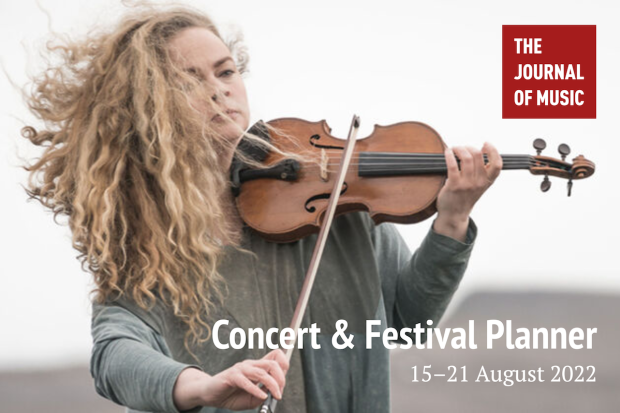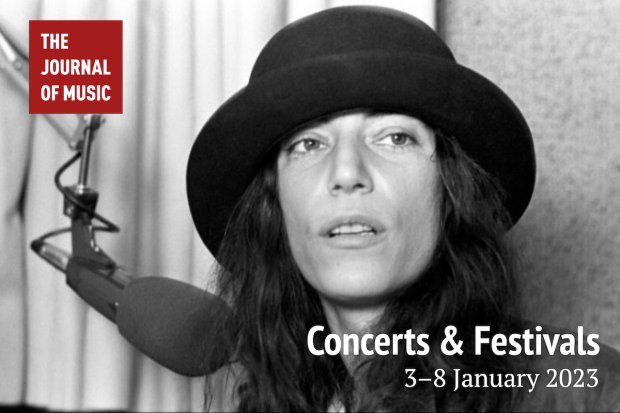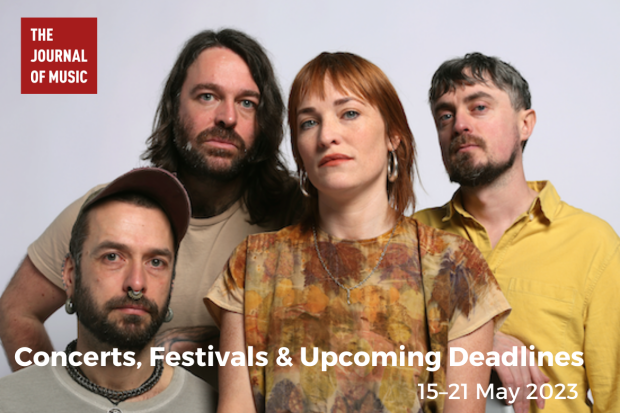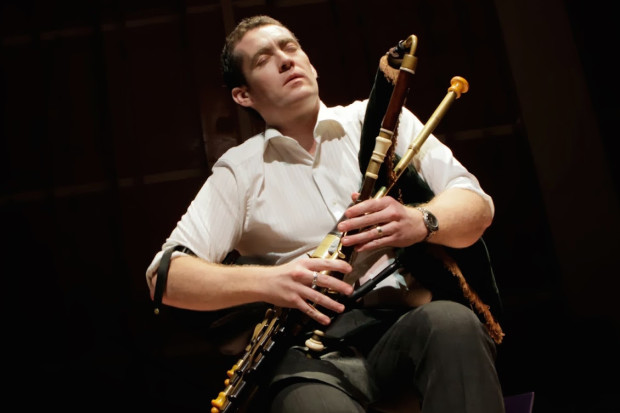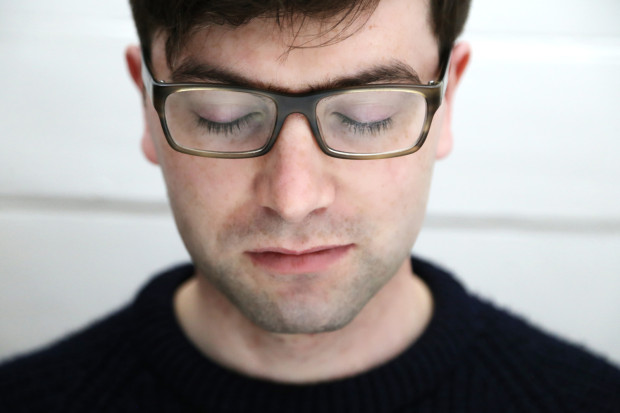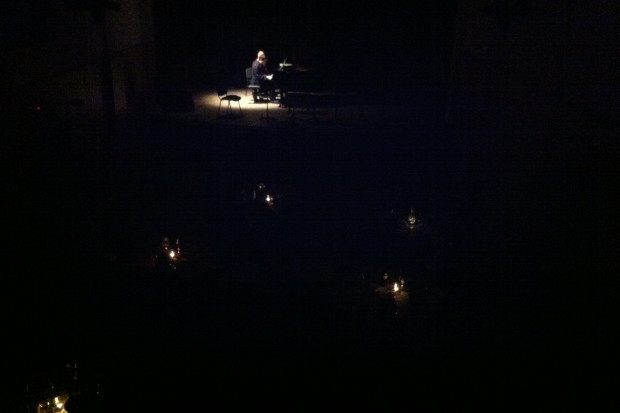The Chosen Ones
A week before the Composers’ Choice series began at the National Concert Hall on 5 April, there was another kind of composer’s choice in Sligo: Ian Wilson, the festival director, had chosen to centre this year’s Sligo New Music Festival on the music of the German-based British composer Rebecca Saunders. Anyone who had heard the Kairos CD that carries her name, or who had heard broadcasts of her work, would know that Saunders is an intensely committed composer who manages to make heart-stopping drama out of minutely researched explorations of sound.
Playing around with the innards of the piano, putting highpitched whistling together with belching brass – this kind of thing is no longer inherently interesting or surprising or shocking, having become almost a cliche of new music. Saunders does use this kind of contrast, she does scrape and slam and tinkle and hum; what makes her work special, however, is the powerful internal logic behind her choices, the intent listening that underlies every sound, and the sense of timing that means her work never becomes a mechanical exercise. On the contrary, you feel almost immediately that you are in a world where every note matters and where there is also a kind of austere delight in physical sound and its possibilities. Ultimately, the poet has the final say over the researcher.
Interviewed by Ian Wilson, Saunders frequently reached for sculptural metaphors, as if her innate tendency was to see her music defined clearly in space. She did not compose to a system and emphasised her close relationship with musicians, which allowed her to explore the precise possibilities and limits of every instrument. On Sunday morning, when three pieces by young composers were workshopped and rehearsed, we saw the excellent understanding Saunders had with musikFabrik – and indeed how constructive and good-humoured those musicians were.
In their two concerts, the German ensemble musikFabrik set pieces by Webern, Ustvolskaya (too rarely heard in Ireland), Lachenmann and Rihm alongside Saunders’ work, with which they are intimately familiar. In a late-evening concert, pianist Isabelle O’Connell played Gubaidulina (Chaconne, an early work that sounded almost lush in this company) Boulez (less bright and definite than expected), Lachenmann (Ein Kinderspiel) and Eunan McCreesh. From the point of view both of coherent and imaginative programming and of performance, this was as good a day’s music-making as one could ask for.
People involved in contemporary music are not slow to complain that they are ignored by the media and unfairly treated even within the arts world. But the creation of a public is a two-way process. Here was a well-organised festival featuring the work of a composer of imagination and integrity, an excellent new-music group and a young Irish pianist. What was the response of Irish composers and musicians? Almost nil. Two composers with local connections attended, but did any others make the trip? How many musicians showed any curiosity about musikFabrik, who have worked and recorded with many significant composers? If this is the level of support offered by those within the scene, perhaps their righteous criticism of others should be tempered by a little self-criticism.
********
The formula behind the Composers’ Choice series is now a familiar one. Irish or Irish-based composers have the opportunity to present a small selection of their own work in combination with music by others, dead or alive, that matter to them in some way. There are, of course, some practical and financial constraints. Even so, the choices made provide a useful entry into the composer’s world for the listening public – who are also invited to hear the composers talk before the concerts. The concerts take place on five successive evenings, so it is difficult, in this rapid over-view, not to see them as indirectly commenting on each other. Where a serious divergence of taste, affinity and belief occurs, it is best to admit it. While I respond to some music of spiritual inspiration and respect the choices that have led Eric Sweeney to his current philosophy of composition (outlined with modesty and characteristic precision in his talk), I was left untouched by almost all the music presented – not only his own (such as Be joyful in the Lord for choir and organ) but also the organ works by Messiaen and Britten. The John Tavener songs were sweet on the ear – but why choose a poem as startling as Blake’s ‘The Tyger’ for such kittenish treatment?
The contrast with Brian Irvine’s concert the following night was itself almost startling. Anyone who saw his Ensemble (dominated by brass and woodwind) at the Project a few years ago will remember the leader in colourful beach-gear directing the high-energy ensemble at one point by waving his legs in the air. Irvine is exuberant as a person, as a conductor and as a composer – almost too much so in the end, as the acceleration towards all-out ecstasy becomes less effective through repetition. Saxophonist Paul Dunmall – who brought his trio to Dublin some time ago – here had the role of free agent, interweaving his mixture of long Coltranean lines and sonic exploration with the organised sound and fury of the ensemble. If some of the inwardness that was shown in the performance of Howard Skempton’s Pole were to find its way into Irvine’s own compositions (often a collage or collision of wildly diverse musical styles), the result might have a longer afterlife in the mind of the listener.
John McLachlan will be well-known to readers of JMI. He opened with a Bach prelude and fugue (begun in rather tentative fashion by Owen Lorigan); the Antipodes String quartet performed pieces by Stravinsky (Concertino), Kurtag (Officium Brevis) and Alejandro Vinao (Phrase and Fiction – for quartet and tape). McLachlan has devoted years of study to some of the major modernist composers. Those of his compositions that I had previously heard had tended towards the earnest elaboration of a concept. The same could be said of sections of String Quartet No. 2 (Neo-Plastic Coloured Shapes), but – whether through or in spite of the analogy with post-perspectival flatness in modern art that he had outlined in his talk – Nuance (for piano solo) and Ghost Machine (for violin and piano) pointed to the discovery of an airier and less constricted musical world.
It was fascinating the following evening to hear Kevin Volans use his sharp intelligence and command of language to point to the creative and intuitive core of music, which cannot be communicated by language or forced into being by the intelligence. He is increasingly disinclined to name his compositions or to discuss them: listeners must open their minds and ears to an unmediated encounter with the music, just as the composer himself must bypass his own knowledge and technique in waiting for the moment when a new work makes itself known intuitively. This approach (reminiscent of the methods of the Zen masters) is perhaps the culmination of a personal journey from the sphere of Stockhausen to that of Feldman. But this is not a matter of petty allegiance: having offered three of his own piano etudes and an engrossing two-part percussion-work, Volans generously gave over the major part of his concert to Kontakte, one of Stockhausen’s early masterworks, for piano, percussion and taped electronics. In Volans’ view, the long months of preparation that went into Kontakte are no guarantee of quality: it is not through his structuring intellect that Stockhausen’s music will live – but through two things he never talks about: his feeling for harmony and his striking imagery (as shown in his ability to create an immediately recognisable soundscape for each major work).
The series came to a gentle close with Marian Ingoldsby’s choice. Her own work (4 Nye Songs and a piece for piano solo) sat happily enough with Mompou, Henry Cowell, Copland and Messiaen and others. Kate Hearne’s confident performance of a virtuoso piece for recorder (and percussion) by Maki Ishii was received with disproportionate but understandable enthusiasm.
Published on 1 July 2004
Barra Ó Séaghdha is a writer on cultural politics, literature and music.












